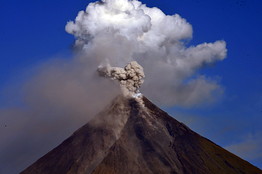Reinsurance: Volcano Not Expected to Impact
 With the obvious exception of travel insurance, it appears the effects of the eruption of the Icelandic volcano Eyjafjallajökull on the insurance and reinsurance markets may be small, although as the volcano is still active it is too early to provide truly accurate estimates.
With the obvious exception of travel insurance, it appears the effects of the eruption of the Icelandic volcano Eyjafjallajökull on the insurance and reinsurance markets may be small, although as the volcano is still active it is too early to provide truly accurate estimates.
According to the Association of Bermuda Insurers and Reinsurers [ABIR], 15 of the top 35 reinsurers in the world are based in Bermuda.
The lack of losses would be a stark contrast after the Feb 27, 2010 earthquake in Chile which registered 8.8 on the Richter Scale and caused significant destruction. Bermuda based reinsurance companies were hit with almost $2 billion in losses from the Chilean earthquake.
Aviation insurance normally covers physical damage to planes, and to date, no airplane has been damaged by the volcanic ash being spewed.
Reuters reports that “airlines which stand to lose millions of euros from a cloud of Icelandic volcanic ash disrupting flights and closing airports across northern Europe are expected to have little recourse to recoup losses from insurance companies.”
International reinsurer Swiss Re saying:
The likelihood of significant impacts on reinsurance wrought by the volcanic eruption on Iceland seems low. It is too early to provide further comment at this point in time.
International reinsurer Hannover Re saying:
We do not expect any claims from this event as business interruption is not covered by aviation insurers.
International reinsurer Munich Re saying:
The renewed eruption of the Eyjafjallajökull volcano has led to widespread shutdowns and cancellations in Europe’s air traffic, yet is not expected to have any other substantial repercussions or give rise to significant losses for the insurance industry.
Even though the eruption makes a spectacular impression, it is not expected to cause major losses for the economy or the insurance industry.
The International Air Transport Association estimated today [Apr 16] that airlines will lose approximately $200 million a day due to the closure of airports all over northern Europe. The cancellations were reflected in stock markets, where the prices of airlines for three most affected countries fell. British Airways shares fell 1.1%, Germany’s Lufthansa fell 2.1%, and Air France-KLM dropped 1.7%.
In the paper titled, “Insurance Risks From Volcanic Eruptions in Europe,” the researchers stated a major eruption of Italy’s Mount Vesuvius could result in 8,000 fatalities, 13,000 serious injuries and total economic losses of more than $24 billion. The research, conducted by the Willis Research Network [WRN] put Vesuvius at the top of the list of Europe’s 10 most dangerous volcanoes.
The WRN team identified the 10 most dangerous European volcanoes based on the size of a potential eruption, the number of people potentially at risk, and the value of property in the area surrounding each volcano. The study found that, together, the 10 volcanoes could affect almost 2.1 million people with an aggregated exposed residential property value of US $85 billion.
The Eyjafjallajokull volcano in Iceland that erupted this week was not on the list, but the Hekla volcano, Iceland’s most active, was ranked as the ninth most dangerous volcano in Europe.
Bermuda has had two days of flight cancellations of the British Airways UK/Bermuda flights, as well as disruption of mail delivery to the UK, Europe and Asia due to the volcano.


Comments (1)
Trackback URL | Comments RSS Feed
Articles that link to this one: